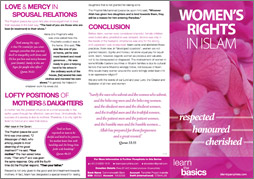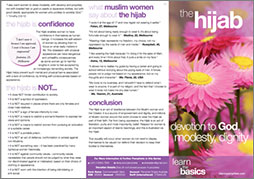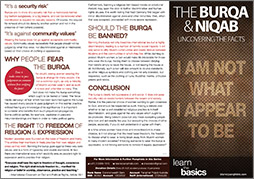Women’s Rights in Islam PDF Version Women in Islam are thought to be subjugated, degraded, oppressed – but are they really? Are millions of Muslims simply that oppressive or are these misconceptions fabricated by a biased media? “And for women are rights over men, similar to those of men over women.” Qur’an 2:228 Over fourteen hundred years ago, Islam gave women rights that women in the West have only recently began to enjoy. In the 1930’s, Annie Besant observed, “It is only in the last twenty years that Christian England has recognised the right of woman to property, while Islam has allowed this right from all times. It is a slander to say that Islam preaches that women have no souls.” (The Life and Teachings of Mohammed, 1932). Men and women all descended from a single person – the Prophet Adam (peace be upon him). Islam does not accept for either of them anything but justice and kind treatment. Equal Reward & Equal Accountability Men and women worship Allah in the same way, meaning they worship the same God (Allah), perform the same acts of worship, follow the same scripture, and hold the same beliefs. Allah (the Arabic word for the One true God of all creation), judges all human beings fairly and equitably. Allah emphasises the just treatment and reward due to both men and women in many verses of the Qur’an: “Allah has promised to the believers, men and women, gardens under which rivers flow, to dwell therein, and beautiful mansions in gardens of everlasting bliss.” Qur’an 9:72 “Never will I allow the loss of the work of any worker amongst you, male or female; you are of one another.” Qur’an 3:195 These verses show that reward is dependent upon one’s actions and not one’s gender. Gender does not play any part in how a person is rewarded and judged. If we compare Islam to other religions, we see that it offers justice between the sexes. For example, Islam dismisses the idea that Eve is more to blame than Adam for eating from the forbidden tree. According to Islam, Adam and Eve both sinned, they both repented and God forgave them both. Equal Right to Knowledge Both men and women are equally encouraged to seek knowledge. The Prophet (peace be upon him) said, “Education is compulsory for every Muslim.” Also, great female Muslim Scholars existed at and around the time of the Prophet (peace be upon him). Some were from his family and others were his companions or their daughters. Prominent amongst them was Aisha, the wife of the Prophet (peace be upon him) through whom a quarter of the Islamic law has been transmitted. Other females were great scholars of jurisprudence and had famous male scholars as their students. Equal Right to Choose a Spouse Islam has honoured women by giving them the right to choose a spouse and keep their original family name once married. Additionally, many have the impression that parents force their daughters into marriage. This is a cultural practice, and has no basis in Islam. In fact, it is prohibited. At the time of Prophet Muhammad (peace be upon him), a woman came to him and said, “My father has married me to my cousin to raise his social standing and I was forced into it.” The Prophet sent for the girl’s father and then in his presence gave the girl the option of remaining married or nullifying the marriage. She responded, “O Messenger of Allah, I have accepted what my father did, but I wanted to show other women (that they could not be forced into a marriage).” Equal yet Different While men and women have equal rights as a general principle, the specific rights and responsibilities granted to them are not identical. Men and women have complementary rights and responsibilities. Aside from external and internal anatomical differences, scientists know there are many other subtle differences in the way the brains of men and women process language, information and emotion, just to mention a few. A socio-biology expert, Edward O. Wilson of Harvard University, said that females tend to be higher than males in verbal skills, empathy and social skills, among other things, while men tend to be higher in independence, dominance, spatial and mathematical skills, rank-related aggression, and other characteristics. It would be foolish to treat both genders the same and to ignore their differences. Islam teaches that men and women have complementary, yet different, roles because it is best suited to their nature. God says: “And the male is not like the female.” Qur’an 3:36 “Does not the One who created, know? And He is the Most Kind, the All Aware.” Qur’an 67:14 The Family Unit God created men and women to be different, with unique roles, skills and responsibilities. These differences are not viewed as evidences of superiority or inferiority, but of specialisation. In Islam, the family is of central importance. The man is responsible for the financial well being of the family while the woman contributes to the family’s physical, educational and emotional well being. This encourages cooperation rather than competition. By fulfilling their mutual responsibilities, strong families are created and hence strong societies. Also, emotionally, neither men nor women live a happy life without one another. Allah describes this beautifully by saying: “They are clothing for you and you are clothing for them.” Qur’an 2:187 Clothing provides comfort, warmth and security as well as making one look good – this is how the relationship between the husband and wife is defined in Islam. Love & Mercy in Spousal Relations The Prophet (peace be upon him) also encouraged men to treat their spouses in the best way, “The best of you are those who are best (in treatment) to their wives.” “And among His signs is that He created or you wives amongst yourselves that you may dwell in tranquillity with them; and He has put love and mercy between your (hearts). Surely in this are Signs for people who reflect.” Qur’an 30:21 Aisha (the Prophet’s wife) was once asked how the Prophet’s conduct was in his home. She said, “He was like one of you at home, yet he was most lenient and most generous … He was ready to give a helping hand to his wives in the ordinary work of the house, [he] sewed his own clothes and mended his own shoes.” In general, he helped in whatever work his wives did. Lofty Positions of Mothers & Daughters A mother has the greatest influence on a child especially in the earlier years through her affection, care and love. Undoubtedly, the success of a society is due to mothers. Therefore, it is only right for Islam to honour and raise their status. Allah says in the Qur’an: “And we have enjoined on man to be dutiful and kind to his Parents, His mother bears him with hardship and she brings him forth with hardship.” Qur’an 46:15 The Prophet (peace be upon him) was once asked, “O Messenger of Allah, who among people is most deserving of my good treatment?” He said, “Your mother.” The man asked twice more, “Then who?” and was given the same response. Only until the fourth time did the Prophet respond, “Then your father.” Reward is not only given to the good and kind treatment towards mothers. In fact, Islam has designated a special reward for raising daughters that is not granted for raising sons. The Prophet Muhammad (peace be upon him) said, “Whoever Allah has given two daughters and is kind towards them, they will be a reason for him entering Paradise.” Conclusion Before Islam, women were considered shameful, female children were buried alive, prostitution was rampant, divorce was only in the hands of the husband, inheritance was only for the strong, and oppression was widespread. Islam came and abolished these practices. Even now, in “developed countries”, women are not granted respect, dignity and honour, let alone equal pay for equal work. Islam, however, regards women as precious and valuable, not to be disrespected or disgraced. The mistreatment of women in some Middle-Eastern countries or Muslim families is due to cultural factors that some Muslims wrongly follow, not because of Islam. Why would many women around the world willingly enter Islam if it is an oppressive religion? We end with the words of our Lord and your Lord, the Creator and Sustainer of all men and women: “Surely the men who submit and the women who submit, and the believing men and the believing women, and the obedient men and the obedient women, and the truthful men and the truthful women, and the patient men and the patient women, and the humble men and the humble women… Allah has prepared for them forgiveness and a great reward.” Qur’an 33:35
Checkout These:




